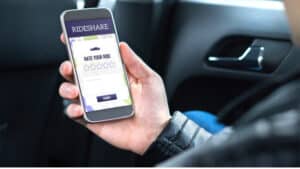Julie J. From Russian Hill asks, “I have seen these pink mustache cars driving around. I checked it out and it is called Lyft, a smart phone based app that lets people use their own cars to act like a taxi. I took a ride with a young guy and then my phone asked me to make a “donation” for the ride, suggesting an amount, and asked me to rate the service. What is the legality of this service and how are they different than taxis?”
Dear Julie, this question is one which is on the cutting edge of law and politics. Lyft is not a taxi. Lyft (like Uber) styles itself as a “ride sharing exchange” claiming solely to maintain a platform where people can use their smart phone to find people willing to give them a ride in a ridiculously mustached vehicle.
In my opinion, this is a mustache ride that no one should ever take. Riding in one of these cars is much like having unprotected sex- while it may seem like fun at the time, it is very, very, risky and you give up a host of your legal rights for the convenience and pseudo cool factor of “ride sharing.”
The people running Lyft are taking 20% of the “donations” which drivers are getting. Its not a social cause: it’s a business which is cloaking itself in the concept of being a futuristic, green, socially progressive alternative to car ownership and a way to overcome your frustrations with trying to get a cab. As part of this business model, you lose many rights and protections you have when you get into a taxi.
Vehicles for hire are generally regulated by the State Public Utilities Commission (PUC). Taxi’s are regulated locally and, in San Francisco, under Article 16 of the San Francisco Police Code. Section 1076 defines a taxicab as a vehicle for hire of distinctive colors operated at rates per mile equipped with a taximeter used for transporting passengers along the public streets.
A pink mustache car is a private vehicle that uses an “app” to “connect” people with each other to provide a shared ride between destinations for a suggested “donation.” You must pay a fare in a taxi or go to jail. If you chose a zero donation in a Lyft vehicle there is no criminal penalty but the yelp-type review of you probably will make it difficult for you to “share a ride” in the future. As Lyft and Sidecar have artfully self styled themselves as “ride share” services they do not fit within the standard definition of a taxi. Currently, while the PUC tries to define and regulate this new concept there is virtually no regulation (i.e., no consumer protection by an independent agency). This is a pink mustache which has been driving through a legal loophole.
There are countless reasons I would never use Lyft and why I would strongly advise others against using it. The first and foremost is that by clicking to “accept the terms” YOU WAIVE YOUR CONSTITUTIONAL RIGHT TO A JURY TRIAL! For the convenience of a groovy ride in a clown mobile you give up a right that people fought and died for. The techies who “hold the space” for the platform want any legal actions against them to be dealt with in secret through binding arbitration.
Is that “progressive?” If taking away your right to a jury trial were not enough, they have structured the user agreement to state that “in no event will we, our subsidiaries, officers, directors, employees or our suppliers, be liable to you for any incidental or consequential damages . . . . including, without limitation, physical damages, bodily injury [or] death.”
Having represented hundreds of people harmed or killed in taxicab related collisions, I can say that such an attempt at escaping liability is, in my opinion, about as despicably corporate as you can get. While this waiver has not yet been tested in court, I can promise you that when someone who has been injured catching a “Lyft” or riding in an Uber car calls my office I will do my best to have these provisions be held to be unconstitutional and to hold Lyft responsible for any fault they may have.









